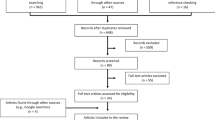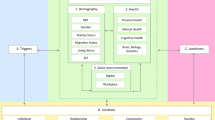Abstract
Background People unemployed and claiming welfare due to poor health are by definition functionally disabled. Understanding the factors associated with such disability is crucial in the development of biopsychosocial formulations and associated occupational rehabilitation. Method A cross-sectional design in a sample of claimants (n = 4,119) of health-related welfare, unemployed due to mental or physical health problems. Participants provided socio-demographic information and completed validated measures of psychological distress, self-efficacy and disability. Hierarchical multiple regression analyses then tested which psychological and socio-demographic factors were associated with disability. Results Despite equal rates of functional disability across health condition groups, differing variables were associated with disability for mental and physical health conditions. Psychological distress was the strongest predictor of disability across all health conditions. For physical conditions, lack of previous employment was the only additional variable associated with current disability and for mental health conditions age and self-efficacy were additional factors. Conclusion Results are discussed in terms of biopsychosocial formulations of health-related unemployment, the potential mechanisms by which psychological distress can influence disability, the methodological limitations of cross sectional regression analyses and the implications for condition-specific occupational rehabilitation.
Similar content being viewed by others
References
Druss BG, Hwang I, Petukhova M, Sampson NA, Wang PS, Kessler RC. Impairment in role functioning in mental and chronic medical disorders in the United States: results from the National Comorbidity Survey Replication. Mol Psychiatry. 2009;14:728–37.
World Health Organization. ICF: international classification of functioning, disability and health. Geneva: World Health Organization; 2001.
Rigg J. Labour market disadvantage amongst disabled people: a longitudinal perspective. Centre for Analysis of Social Exclusion, report 103, 2005.
Mclean C, Carmona C, Francis S, Wohlgemuth C, Mulvihill C. Worklessness and health—what do we know about the causal relationship? Evidence review. London: Health Development Agency; 2005.
Jin RL, Shah CP, Svoboda TJ. The impact of unemployment on health: a review of the evidence. Can Med Assoc J. 1995;153:529–40.
Fryer D. Benefit agency? Labour market disadvantage, deprivation and mental health. Psychologist. 1995;8:265–72.
Wanberg C, Griffiths R, Gavin M. Time structure and unemployment: a longitudinal investigation. J Occup Organ Psychol. 1997;70:75–95.
Waters L, Moore K. Reducing latent deprivation during unemployment: the role of meaningful leisure activity. J Occup Organ Psychol. 2002;75:15–32.
Warr P. Work, unemployment and mental health. Oxford: Oxford University Press; 1987.
Jackson T. Differences in psychosocial experiences of employed, unemployed, and student samples of young adults. J Psychol. 1999;133:49–60.
Grove B. Escaping from incapacity—a biopsychosocial approach to overcoming health-related unemployment. 2006. Available at http://www.unum.co.uk/Home/AccessiblePDF/CMOreport2006.htm#4.
Creed P, Watson T. Age, gender, psychological wellbeing and the impact of losing the latent and manifest benefits of employment in unemployed people. Aust J Psychol. 2003;55:95–103.
Clay FJ, Newstead SV, Watson WL, McClure RJ. Determinants of return to work following non life threatening acute orthopaedic trauma: a prospective cohort study. J Rehabil Med. 2010;42:162–9.
McKee-Ryan F, Song Z, Wanberg C, Kinicki A. Psychological and physical well-being during unemployment: a meta-analytic study. J Appl Psychol. 2005;90:53–76.
Waddell G, Burton K. Is work good for your health and wellbeing?. London: TSO; 2006.
Schaufeli WB, Van Yperen NW. Unemployment and psychological distress among graduates: a longitudinal study. J Occup Organ Psychol. 1992;65:291–305.
Waddell G, Burton AK. Concepts of rehabilitation for the management of common health problems. London: The Stationery Office; 2004.
Kertay L, Pendergrass TM. Biopsychosocial factors in claims for disability compensation: issues and recommendations. In: Schultz IZ, Gatchel RJ, editors. Handbook of complex occupational disability claims: early risk identification, intervention and prevention. New York: Kluwer; 2005.
Lee SK, Vinokur AD. Work barriers in the context of pathways to the employment of welfare-to-work clients. Am J Commun Psychol. 2007;40:301–12.
Hays RD, Wells KB, Sherbourne CD, Rogers W, Spritzer K. Functioning and well-being outcomes of patients with depression compared with chronic general medical illnesses. Arch Gen Psychiatry. 1995;52:11–9.
Geerlings SW, Beekman ATF, Deeg DJH, Twisk JWR, Van Tilburg W. The longitudinal effect of depression on functional limitations and disability in older adults: an eight-wave prospective community-based study. Psychol Med. 2001;31:1361–71.
Ericsson M, Poston WSC, Linder J, Taylor JE, Haddock CK, Forey JP. Depression predicts disability in long-term chronic pain patients. Disabil Rehabil. 2002;24:334–40.
Rai D, Kosidou K, Lundberg M, Araya R, Lewis G, Magnusson C. Psychological distress and risk of long-term disability: population-based longitudinal study. J Epidemiol Community Health. 2011. doi:10.1136/jech.2010.119644.
Manninen P, Heliövaara M, Riihimäki H, Mäkelä P. Does psychological distress predict disability? Int J Epidemiol. 1997;26:1063–70.
O’Leary A. Self-efficacy and health. Behav Res Ther. 1985;23:437–51.
Brouwer S, Reneman MF, Bültmann U, Klink JJL, Groothoff JW. A prospective study of return to work across health conditions: perceived work attitude, self-efficacy and perceived social support. J Occup Rehabil. 2010;20(104):112.
Turner JA, Ersek M, Kemp C. Self-efficacy for managing pain is associated with disability, depression, and pain coping among retirement community residents with chronic pain. J Pain. 2005;6:471–9.
Jang Y, Haley WE, Small BJ, Mortimer JA. The role of mastery and social resources in the associations between disability and depression in later life. Gerontologist. 2002;42:807–13.
Department of Health. National service framework for older people. 2001. Available at http://www.dh.gov.uk/prod_consum_dh/groups/dh_digitalassets/@dh/@en/documents/digitalasset/dh_4071283.pdf.
Hunt SP, McEwan J, McKenna SP. Subjective health assessments and the perceived outcome of minor surgery. J Psychosom Res. 1984;28:105.
Maddox G, Douglas E. Aging and individual differences. J Gerontol. 1974;29:555–63.
Cornelius LR, van der Klink JJ, Groothoff JW, Brouwer S. Prognostic factors of long term disability due to mental disorders: a systematic review. J Occup Rehabil. 2011;21(2):259–74.
Merill SS, Seerman TE, Kasl SV, Berkman LF. Gender differences in the comparison of self-reported disability and performance measures. J Gerontol A Biol Sci Med Sci. 1997;52A:M19–26.
Harvey SB, Henderson M, Lelliott P, Hotopf M. Mental health and employment: much work to be done. Br J Psychiatry. 2009;194:201–3.
Black C. Working for a healthier tomorrow. London: TSO; 2008.
Barnes H, Hudson M. Pathways to work: qualitative research on the Condition Management Programme. Department for Work and Pensions Research Report 364. Leeds: Corporate Document Services; 2006.
Department for Work and Pensions [DWP]. Pathways to work: helping people into employment. London: Author; 2002.
Mundt J, Marks IM, Shear MK, Greist JH. The Work and Social Adjustment Scale: a simple measure of impairment in functioning. Br J Psychiatry. 2002;180:461–4.
Cella M, Sharpe M, Chalder T. Measuring disability in patients with chronic fatigue syndrome: reliability and validity of the Work and Social Adjustment Scale. J Psychosom Res. 2011;71:124–8.
Reme SE, Kennedy T, Jones R, Darnley S, Chalder T. Predictors of treatment outcome after cognitive behavior therapy and antispasmodic treatment for patients with irritable bowel syndrome in primary care. J Psychosom Res. 2010;68:385–8.
Skerrett TN, Moss-Morris R. Fatigue and social impairment in multiple sclerosis: the role of patients’ cognitive and behavioral responses to their symptoms. J Psychosom Res. 2006;61:587–93.
Mclaughlin TJ, Aupont O, Bambauer KZ, Stone P, Mullan MG, Colagiovanni J, Polishuk E, Johnstone M, Locke SE. Improving psychological adjustment to chronic illness in cardiac patients. J Gen Intern Med. 2005;20:1084–90.
Evans C, Connell M, Barkham M, Margison F, McGrath G, Mellor-Clark J, et al. Towards a standardised brief outcome measure: psychometric properties and utility of the CORE-OM. Br J Psychiatry. 2002;180:51–60.
Connell E, Barkham M, Stiles WB, Twigg E, Singleton N, Evans O, et al. Distribution of CORE-OM scores in a general population, clinical cut-off points and comparison with the CIS-R. Br J Psychiatry. 2007;190:69–74.
Kellett S, Bickerstaffe D, Purdie F, Dyke A, Filer S, Lomax V, et al. The clinical and occupational effectiveness of condition management for incapacity benefit recipients. Br J Clin Psychol. 2011;50:164–77.
Barkham M, Margison F, Leach C, Lucock M, Mellor-Clark J, Evans C, et al. Service profiling and outcomes benchmarking using the CORE-OM: toward practice-based evidence in the psychological therapies. J Consult Clin Psychol. 2001;69(2):184–96.
Schwarzer R, Jerusalem M. Generalized self-efficacy scale. In: Weinman J, Wright S, Johnston M, editors. Measures in health psychology: a user’s portfolio. Windsor: NFER-Nelson; 1995. p. 35–7.
Schwarzer R, Born A, Iwawaki S, Lee Y-M. The assessment of optimistic beliefs; comparison of Chinese, Indonesian, Japanese and Korean versions of the Generalised Self-Efficacy Scale. Psychologia. 1997;40:1–13.
Bender R. Introduction to the use of regression models in epidemiology. Methods Mol Biol. 2009;471:179–95.
Cohen J, Cohen P, West SG, Aiken LS. Applied multiple regression/correlation analysis for the behavioral sciences. 3rd ed. London: Routledge Academic; 2003.
Aiken LS, West AG. Multiple regression. California: Sage Publications; 1991.
Tabachnick BG, Fidell LS. Using multivariate statistics. 4th ed. Boston: Allyn and Bacon; 2001.
Bandura A. Guide for constructing self-efficacy scales. In: Pajares F, Urdan TC, editors. Self-efficacy beliefs of adolescents. Greenwich, CT: Information Age Publishing; 2006. p. 307–38.
Schulman BM. Worklessness and disability: expansion of the biopsychosocial perspective. J Occup Rehabil. 1994;4(2):113–24.
Franche RL, Frank J, Krause N. Prediction of occupational disability: models, factors and outcomes. In: Schultz IZ, Gatchel RJ, editors. Handbook of complex occupational disability claims: early risk identification, intervention, and prevention. New York: Springer; 2009.
Beatty C, Fothergill S. Incapacity benefits in the UK: an issue of health or jobs? Centre for Regional Economic and Social Research, 2011. Available at http://www.social-policy.org.uk/lincoln/Beatty.pdf.
Department for Work and Pensions. Employment and support allowance work capability assessment: official statistics. Author, 2010. Available at http://research.dwp.gov.uk/asd/workingage/esa_wca/esa_wca_27072010.pdf.
Kawachi I, Berkman LF. Social ties and mental health. J Urban Health. 2001;78:458–67.
Lindstrom M. Social capital, the miniaturisation of community and self-reported global and psychological health. Soc Sci Med. 2004;59:595–607.
Smith TW, Aberger EW, Follick MJ, Ahern DK. Cognitive distortion and psychological distress in chronic low back pain. J Consult Clin Psychol. 1986;54(4):573–5.
Ray O. How the mind hurts and heals the body. Am Psychol. 2004;59(1):29–40.
Proudfoot J, Guest D, Carson J, Dunn G, Gray J. Effect of cognitive-behavioural training on job-finding among long-term unemployed people. Lancet. 1997;350(9071):96–100.
Tourangeau R, Yan T. Sensitive questions in surveys. Psychol Bull. 2007;133:859–83.
Author information
Authors and Affiliations
Corresponding author
Rights and permissions
About this article
Cite this article
Purdie, F., Kellett, S. & Bickerstaffe, D. Predictors of Functional Disability in Disability Welfare Claimants. J Occup Rehabil 22, 447–455 (2012). https://doi.org/10.1007/s10926-012-9368-y
Published:
Issue Date:
DOI: https://doi.org/10.1007/s10926-012-9368-y




